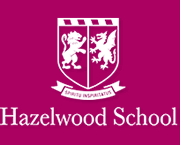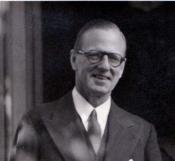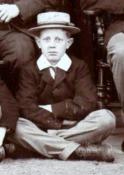
War Memorial
| Douglas Parke GORDON | |
|
Internee Date of birth: 1st June 1895 Date of death: 3rd February 1966 Died aged 70 Unknown |

|
| Douglas Parke Gordon was born at 26 Wolstenholme Road, Ecclesall Bierlow, in Yorkshire on the 1st of June 1895 the elder son of Dr Robert Gordon MD and Beatrice Mary Gertrude (nee Wilks) Gordon of 26 Wostenholm Road, Sheffield. He was educated at Hazelwood School until December 1908 where he was a member of the Choir and was a member of the Cricket XI in 1908. The school magazine wrote the following on his 1908 cricket season: -"Has a very safe pair of hands, and plays with a nice straight bat, but rarely assumes more than a defensive attitude." On leaving the school the magazine wrote the following of him: - "...proceeds to Wellington, where we hope he will continue to make good use of his brains. He has been a most useful member of the choir and Cricket XI, and leaves many friends behind who will surely miss him." He went on to Wellington College on a Classical Scholarship where he was in Lynedoch House from January 1909 to 1913. He was appointed as a Prefect in 1913. He went on to Pembroke College Cambridge on a Classical Exhibition in October 1913. On the outbreak of war he was studying modern languages in Berlin. On the 7th of August 1914 he and his fellow students were taken from their lodging by the German police and interrogated at length, being allowed to return to their digs providing they reported every three days. On the 6th of November they were taken by the police and placed in Ruhleben Camp, a former trotting school to the North East of Berlin, where ultimately some 4,500 English internees were held. While at Ruhleben he studied for the examination of the Royal of Society of Arts, Manufacturers and Commerce by whom he was awarded a Silver Medal. He was multilingual, being fluent in French & German, with some Italian, Spanish and a little Russian. He was held until the 22nd of November 1918 when, after a four day journey accompanied by the Danish Red Cross, he landed at Leith to a hearty reception. On his return he proceeded to take up his place at Pembroke College where he achieved a First Class Degree in Modern Languages in 1920. He passed the examinations for the entrance to the Foreign Office but was rejected on grounds of health. He was instead employed by Lloyds and National Provincial Foreign Bank, working on the Continent where he ultimately became an Inspector. He returned to England in the 1930's to become Manager of their Haymarket branch in London, where he numbered the Aga Khan among his customers. He was married at St Mary Abbots Church Kensington on the 30th of April 1936 to Mary Agnes Boocock (nee Wearing) with his brother Geoffrey acting as best man; they honeymooned in the North of England. He adopted her son, Geoffrey Wardley Boocock and they bought a flat together at 13 Thanet Court, Queen's Drive Ealing. During the Second World War he was a member of both the Home Guard and of an anti-aircraft battery for three nights a week. He was diagnosed with tuberculosis and was forced to retire from the bank early in 1950. He spent time being treated at the Royal Brompton Hospital and at a convalescent unit at Petworth in Sussex. On his recovery he worked as a stockbroker's analyst and managed a hostel in Kensington for a while before moving from Ealing to Seaford. He and his wife retired to "Bydand", a bungalow at Seaford where they died in a house fire. |
|
 | |
| Went on to Wellington College |
Back